
Tehran is the capital and largest city of Iran and also the largest city in Tehran Province. It also serves as the capital of the province, county and the Central District. With a population of around 9.4 million in the city, and 16.8 million in the metropolitan area, Tehran is the most populous city in Iran and Western Asia, the second-largest metropolitan area in the Middle East after Cairo, and the 24th most populous metropolitan area in the world. Greater Tehran includes several municipalities, including "New Town of Andisheh", "Islam Shahr", "Shahreh Qods", "Shahryar", "Pakdasht" and "Shamiran".

The Milad Tower, also known as the Tehran Tower, is a multi-purpose tower in Tehran, Iran. It is the sixth-tallest tower and the world's first telecommunication tower in terms of the usage area of the top structure and the tallest tower in Iran and the 24th-tallest freestanding structure in the world. The construction of this tower took about 11 years and 7 months
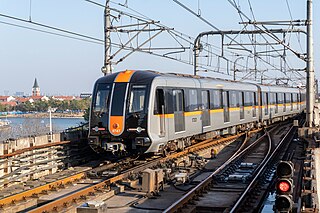
The Shanghai Metro (Chinese: 上海地铁; pinyin: Shànghǎi Dìtiě; Shanghainese: Zaon6he5 Di6thiq7) is a rapid transit system in Shanghai, operating urban and suburban transit services to 14 of its 16 municipal districts and to the neighboring township of Huaqiao, in Kunshan, Jiangsu Province.
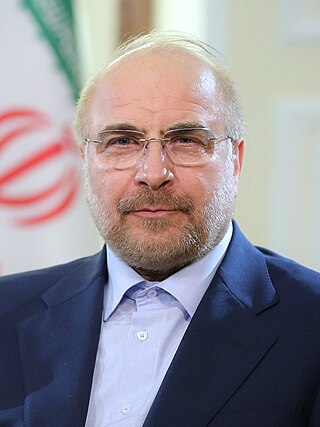
Mohammad Bagher Ghalibaf or Mohammad Baqer Qalibaf is an Iranian conservative politician, former military officer, and current Speaker of the Parliament of Iran since 2020. He held office as the Mayor of Tehran from 2005 to 2017. Ghalibaf was formerly Iran's Chief of police from 2000 to 2005 and commander of the Revolutionary Guards' Air Force from 1997 to 2000.

The Tehran Metro is a rapid transit system serving Tehran, the capital of Iran. It is the largest metro system in the Middle East. The system is owned and operated by Tehran Urban and Suburban Railway. It consists of six operational metro lines, with construction under way on six lines including northwestern extension of line 4, south extension line 6, northwestern and east extension line 7 and Line 10, Line 8 and 9.
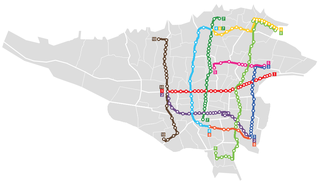
Tehran Bus Rapid Transit was officially inaugurated in 2008 in order to facilitate the motor traffic in Tehran. As at 2011 the bus rapid transit (BRT) system had a network of 100 kilometers which transports 1.8 million passengers on a daily basis.

The Emam Khomeini Metro Station is the junction of Tehran Metro Line 1 and Line 2. The station was opened on 21 February 2000, it is located in Toopkhaneh Square between Panzdah-e-Khordad Metro Station and Saadi Metro Station in Line 1 and Mellat Metro Station and Hasan Abad Metro Station in Line 2.

Mirdamad Metro Station is a station in Tehran Metro Line 1, located next to Mirdamad Boulevard. It was opened on 19 May 2009. The station has an outdoor parking facility for commuters.
Doctor Shariati Metro Station is a station in Tehran Metro Line 1. It is located in Shariati Street. It is between Mirdamad Metro Station and Gholhak Metro Station. It was opened on 19 May 2009.
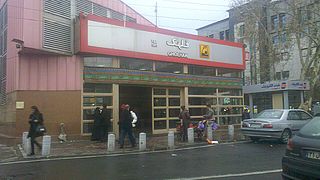
Gholhak Metro Station is a station of Tehran Metro Line 1. It is located in Shariati Street in Gholhak neighborhood. The neighboring stations are Shariati and Shahid Sadr. It was opened on 19 May 2009.

Tehranpars Metro Station is the eastern end of Tehran Metro Line 2, in Iran. It is located in the junction of Resalat Expressway and Hojar-ibn Ady. It is between Farhangsara Metro Station and Shahid Bagheri Metro Station.

Golshahr Metro Station is the former western end of Tehran Metro Line 5. It is located in Mehrshahr in southwest of Karaj. In December 2019 Line 5 has been extended further west beyond this station to Hashtgerd.
Tehran Metro Line 1, coloured red on system maps, runs north–south and is 86.9 kilometers (54.0 mi) of which 14.9 km (9.3 mi) is underground and the rest at grade. The number of stations along the main line is 29 of which 22 stations are underground and 7 above. The Airport branch has another 3 stations, all at grade. As of 2005, the line's total capacity is 650,000 passengers per day and trains make a scheduled stop of 20 seconds per station. The trains are made up of seven wagons, giving a nominal capacity of 1,300 seated and standing passengers. The maximum speed of the trains is 80 km/h (50 mph) per hour, in practice tempered to an average 45 km/h (28 mph) due to station stops, but 120 km/h (75 mph) on the Airport branch, so travel time for the 49 km (30 mi) from Shahed - Bagher Shahr Metro Station to Parand is just 34 minutes.

Tehran Metro Line 2, which opened between Sadeghieh and Imam Khomeini in February 2000, is 20.4 kilometers (12.7 mi) long, with 19 km (12 mi) as a subway and 1.4 kilometers (0.87 mi) elevated. At this time, there were 19 stations along the line, of which Imam Khomeini Station was shared by Line 1. Line 2 is coloured blue on system maps and runs mostly east–west through the city.
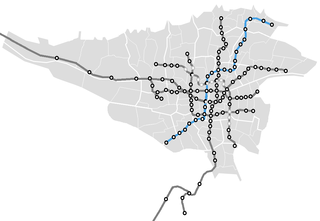
Tehran Metro Line 3 travels from northeast to southwest. Line 3 is one of the most important lines as it connects southwest Tehran to northeast, crosses busy parts of the capital city, and can help to alleviate traffic problems. About 7 kilometers (4.3 mi) of Line 3 became operational in December 2012, followed by 12 kilometers (7.5 mi) in April 2014, and finally, the last section of the line which is 18 kilometers (11 mi) opened on September 22, 2015, increasing the length of the line to a total of 33.7 kilometers (20.9 mi).

Line 4 is one of several lines of the Tehran Metro. The line is 24.4 km (15.2 mi) with 20 main stations, 3 stations along a domestic airport-serving branch line and a terminal (depôt).
Nabard Metro Station is a station of Tehran Metro Line 4. It is located in Piruzi street at Cocacolla crossroad next to Kasa Commercial Complex.

Tajrish Metro Station is the northern terminus station of Tehran Metro Line 1. It is also the northernmost Tehran Metro station. It is located in the area called Tajrish, district 1 municipality in northern Tehran, Iran. The station is located at Qods Square, in the northernmost section of Shariati Street. It has an area of 150,000 sq.m with 16 escalators and 8 elevators. The Tajrish Metro Station was inaugurated on 19 February 2012.
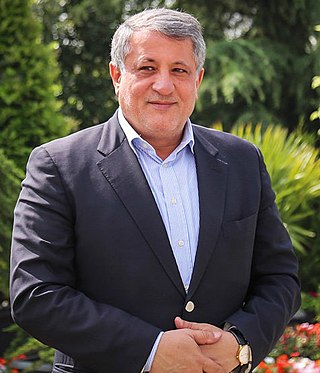
Mohsen Hashemi Rafsanjani is an Iranian politician, academic and engineer who served as a member and was chairman of the City Council of Tehran from 2017 to 2021. He was the deputy director of Iran's Islamic Azad University from 2013 until 2017 and chairman and CEO of Tehran Metro for 13 years. He was the main reformist member candidate for the fourth period of the Tehran city council in 2013 as Tehran Mayor, but lost to Mohammad Bagher Ghalibaf. In 2017, he was elected as a city councilor and later was elected as chairman of the council.
















